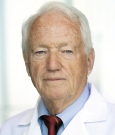Brian E. Henderson, MD, began his medical path as a researcher in virology, and as a young scientist, he ventured to Africa as part of a Centers for Disease Control team to study yellow fever. The better part of his esteemed medical career, however, was as one of the world’s most respected authorities in cancer epidemiology. Dr. Henderson died on June 20, 2015. He was 77 years old.
He had been a Professor at the University of Southern California (USC) School of Medicine since 1970. From 1983 until 1994, he served as Director of the Kenneth Norris Jr. Comprehensive Cancer Center at USC, and from 2004 to 2007, he was Dean of USC’s Keck School of Medicine.
Early Life and Education
Dr. Henderson was born on June 27, 1937, in San Francisco. His father, O’Brien Henderson, had emigrated from Ontario, Canada, in 1921 where he settled in the San Francisco area, meeting a young woman who would soon become his wife. The couple moved to San Leandro, California, where Brian and his two siblings were born.
Dr. Henderson graduated from San Leandro High School in 1954, where he was president of the science club and a star center on the high school’s football team. He would remain a lifelong lover of sports and a devoted fan of San Francisco’s pro teams, the baseball Giants and football 49ers.
In 1957, Dr. Henderson graduated from the University of California, Berkeley, with a major in English. While attending the University of California, San Francisco, Medical School in 1960, Dr. Henderson met Judith McDermott, a TWA stewardess. They would marry that same year.
The couple moved to Chicago, where Dr. Henderson completed his studies, receiving his medical degree from the University of Chicago Medical School. Dr. Henderson completed his internship and residency at Massachusetts General Hospital, Boston.
Adventurous Spirit
Early on in his career, Dr. Henderson’s adventurous spirit carried him to Africa to study yellow fever, and in 1969 he was part of a U.S. delegation on hemorrhagic fevers that went to the Soviet Union. He went on to join the first U.S. scientific delegation to the People’s Republic of China. However, in 1970, after President Nixon signed the National Cancer Act into law, Dr. Henderson turned his sights on cancer and joined the Keck School of Medicine as Associate Professor of Pathology.
In 1972, Dr. Henderson set up the Los Angeles Cancer Surveillance Program—the county’s cancer registry—at USC, where it remains today as a much-coveted resource to researchers nationwide. The registry has elucidated countless medical issues, including the link between combination hormone replacement therapy and increased breast cancer risk in postmenopausal women as well as how intense smokers are more likely to develop aggressive bladder cancers.
Two decades later, Dr. Henderson established the Hawaii–Los Angeles Multiethnic Cohort, an influential study following 215,000 people that has led to numerous influential findings on cancer risk factors. The Cohort’s work continues today, with dozens of papers published from the study each year.
Intellectual Force of Nature
In a statement, nationally recognized oncologist and researcher Stephen B. Gruber, MD, PhD, MPH, Director of the USC Norris Comprehensive Cancer Center, said:
Brian Henderson was an intellectual force of nature who had many gifts to share both through science and in simple acts of kindness. The world is truly a better place because of Brian Henderson. He changed the course of American medicine and was among the first to recognize that many cancers could be understood, prevented, and managed with hormones. There is no question that he saved the lives of countless men and women.
In 1992, Dr. Henderson was inducted into the Institute of Medicine of the National Academy of Sciences. In 2004, he was one of the first scientific experts selected to the oversight committee for the California Institute of Regenerative Medicine.
When asked about his career and work during an interview, Dr. Henderson said, “In the course of my travels, I feel fortunate to have been taught and to have received more than I could possibly have given.” He remained an active researcher and valued colleague until a few weeks prior to his death.
Dr. Henderson is survived by his wife, 5 children, and 11 grandchildren. ■


